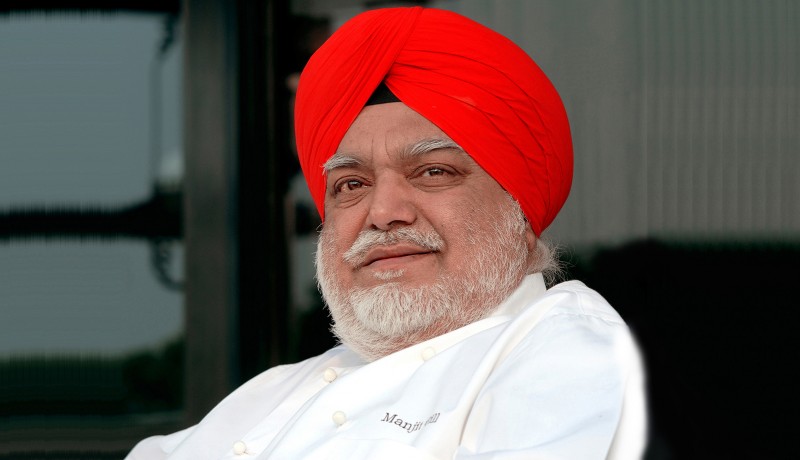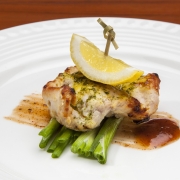
People

Celebrated chef Manjit Singh Gill returns to his roots and shares his culinary philosophy
“Conquer taste, and you will have conquered the self.” The opening line of R K Narayan’s famous story, The Vendor of Sweets, aptly sums up both the culinary skill and the philosophy of Manjit Singh Gill. It is perhaps this maxim, or a version of it, that has powered his career as a celebrated chef at the ITC Group. “In many respects, my philosophy on food and my life are the same—both should be an experience of happiness, serenity and joyful living. These principles have developed from a broad range of professional experiences as well as contacts with people from diverse cultures and lifestyles,” says the 67 year-old, who was recently appointed chairman of the World Culinary Heritage and Culture Committee by the World Association of Chefs Societies.
Born into a middle-class Sikh family, Gill graduated from Delhi University with a bachelor’s degree in science before he went on to pursue a degree in hotel management. He joined the ITC Maurya Sheraton Hotel in 1977, and took over as its executive chef in 1981. In the decades that followed, Gill built some of the hotel chain’s flagship restaurants, including Bukhara, famous for its Northwest Frontier tandoori fare; Dum Pukht, popular for grand Awadhi dishes; Dakshin, offering delicacies from peninsular India; Kabab and Kurry, whose cuisine is inspired by the heart of the subcontinent; and the latest, Royal Vega, a vegetarian eatery. His research on the cuisine of the nawabs led to the opening of Jolly Nabobs at the ITC Windsor in Bengaluru. While Michelin star and other chefs around the world turn kitchens into laboratories and put on theatrical productions with ingredients such as liquid nitrogen, Gill believes in soulful cooking. A staunch practitioner of ‘slow food’ and the science of Indian gastronomy, he is also a passionate teacher of the craft. With a view to educating the public about the ethos of Indian cooking, Gill was the first professional chef to host a series of television shows like Aap Ka Naashta and Daawat as early as 1983. He has also authored books; well-known titles include Eating Wisely & Well, Indian Spa Cuisine and the commemorative compilation Fire/Water/Earth/Air/Ether, Secrets of India Gastronomy.
For this culinary ambassador, “every guest is a VIP” whether dignitaries like Prince Charles and Princess Diana, whom he served at the palace of the Maharaja of Jaipur in 1992; or media professionals at the Le Cordon Bleu in London in 1993; or the 3,000 guests at the World Economic Forum in 2011. In an email interview to Suparna-Saraswati Puri, Manjit Singh Gill looks back at his 40-year career and savours some special memories. Excerpts from the interview:
What got you interested in cooking in the first place?
I always had a way with my hands and, from a very early age, I was always eager to create science projects, which meant using my hands. My father, a law graduate who later joined the Indian freedom struggle, encouraged me to enrol into hotel management. While doing the course, I took to the kitchens and realised that it complemented my interest to work with my hands.
Whom do you credit for your talent in the kitchen?
It comes a little from my mother and my grandmother. My thinking is similar to both of them. I spent most of my holidays in villages and I still have vivid memories of that time—how food is grown, cooked and eaten. One of the lessons I learnt from my mother was that you need not be rich to make soulful and tasty food; it is achieved by skill and knowledge.
You’ve come a long way at the ITC Group. How do you view your journey and how do you describe your legacy to the group?
Whatever I have achieved is owing to the freedom the group has given me to express my talent. I strongly believe that you are what an organisation makes of you and no individual is bigger than the organisation.
There is an explosion of cuisine in India and food from all over the world is now easily available at the click of the mouse. What has this done to the culinary experience?
Well, I think people have more choices today; there is space for all kinds of food. Chefs are opening creative restaurants and the economy is booming!
You were given the Lifetime Achievement Award by the Ministry of Tourism. What propels your passion—a sense of competition or the urge to cook exquisitely unique foods?
I have always been in competition with myself and no one else. I am traditional yet modern. What inspired me to carry on was my quest to understand and decode the science of Indian gastronomy and food. It is very deep; the more you understand it, the more you improve. The only regret is that if I had known Sanskrit, my learning would have been better.
I believe in the ‘slow food’ philosophy and I wish to promote hygienic and healthy food for all through biodynamic agriculture, which is based on this philosophy. The science of Indian gastronomy believes and exemplifies the simple principle that our food is grounded with five elements, five senses, three strands (these are the three basic forms or gunna), three humours, six savours and nine feelings.
What is ‘slow food’ and do you really implement this philosophy in ITC’s high-end restaurants?
Good, clean, fair food for all is slow food and its tenets including creating sustainable food chains. Yes, it is implemented in high-end restaurants serving high-end, quality food. The slow food philosophy is commercially viable because when implemented, it becomes affordable for the entire food chain.
In times when Michelin star restaurants and chefs seem to dominate the culinary experience globally, how do you see your slow food philosophy influencing foodies?
With due respect to these ‘stars’ globally, the philosophy of slow food is much deeper in India, and we still have to wait before it dominates the world.
How have culinary styles evolved over time?
Over the years, diners keep getting younger and chefs keep getting older! It is therefore only wise that chefs subtly change their cooking style while keeping the basic character of the food in mind to adapt to the change in environment.
You were a part of the Culinary Survey of India. Tell us about that.
In 2014, I took the initiative with the Government of India’s Ministry of Tourism to do a culinary survey of the traditional recipes of each district in India. The first phase of the survey has been completed. It was a wonderful forum of creative minds from the industry and ministry, and we are in the process of documenting our traditional recipes and archiving them.
If you could pick the most memorable moment of your career, what would it be?
Every day is special and holds good memories as I believe cooking is an activity that needs to be celebrated daily. I always sleep with the thought that I will create something better tomorrow.
What do you consider your greatest achievement?
It is a great feeling of satisfaction that, at the end of my career, I got to open a totally vegetarian, fine dining restaurant, the Royal Vega at the ITC Grand Chola in Chennai, and that my company completely supported me in this endeavour.
How has ageing impacted your work?
What ageing? I have never felt younger!
FROM THE CHEF’S KITCHEN
Murgh Mirch Tikka
Serves 4
Ingredients
- Chicken breasts: 6
- Chicken thighs: 4; boneless
For 1st marinade
- Rock salt: ½ tsp
- Ginger-garlic paste: 2 tbsp
- Malt vinegar: 2 ½ tbsp
For 2nd marinade
- Cheese: ¼ cup; grated
- Green chilli: ½ tsp; deseeded & chopped
- Black pepper: 1 tsp; freshly pounded
- Coriander leaves: 1 tbsp; chopped
- Corn flour: ½ tsp
- Fresh cream: ¼ cup
For serving
- Lemon juice: 1 tsp
- Butter: 1 tsp
Method
Pat the chicken dry with a clean cloth and cut each piece into two. Take the first marinade in a bowl and add chicken pieces to it. Mix and rub each piece well; cover with a lid and steep it for 15-20 minutes. Take a wide bowl and cream the grated cheese in it. Take care not to knead it vigorously to avoid the cheese from releasing fat. Add corn flour and 1 tbsp of cream and mix gently. Add green chilli, black pepper and coriander leaves and mix well. Squeeze the marinated chicken gently to remove the excess moisture and add it to the cream marinade. Skewer and cook in the tandoor till done or in a preheated oven at 180ᴼC on a roasting rack. Drizzle lemon juice and butter on top and serve hot.
September 2017
you may also like to read
-
For the love of Sanskrit
During her 60s, if you had told Sushila A that she would be securing a doctorate in Sanskrit in the….
-
Style sensation
Meet Instagram star Moon Lin Cocking a snook at ageism, this nonagenarian Taiwanese woman is slaying street fashion like….
-
Beauty and her beast
Meet Instagram star Linda Rodin Most beauty and style influencers on Instagram hope to launch their beauty line someday…..
-
Cooking up a storm!
Meet Instagram star Shanthi Ramachandran In today’s web-fuelled world, you can now get recipes for your favourite dishes at….








